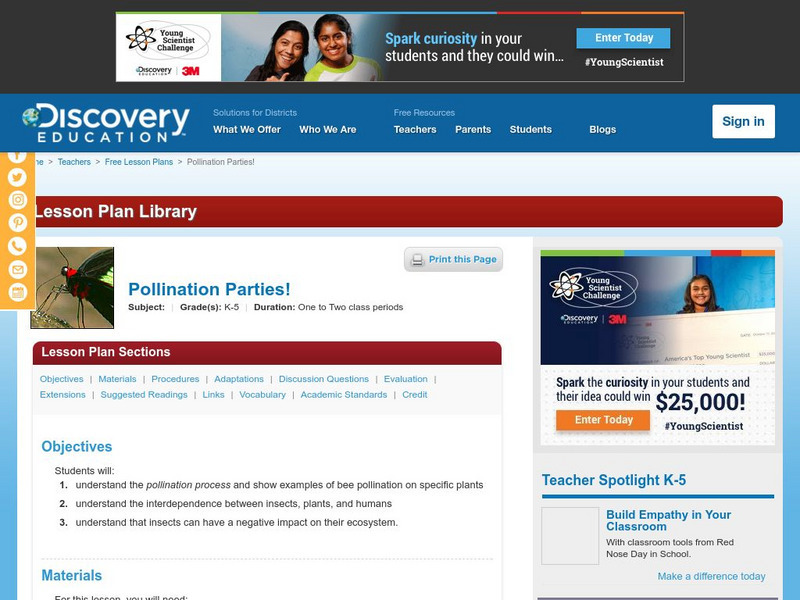Hi, what do you want to do?
Curated OER
Life Cycle of Trees
For this Life Cycle of Trees worksheet, students read one page about the life cycle of a trees. Students define 12 terms from the reading.
Curated OER
How Does Your Garden Grow?
Students complete activities to learn about the life cycle of a seed. In this plant growth lesson, students complete activities for the life cycles of seeds.
Curated OER
Most Troublesome Exotic Invasive Plant Species Web Quest
Young scholars participate in a Web Quest activity in which they identify common exotic invasive plant species of the Southern Appalachian Region. After identifying the top 10 exotic invasive species, they choose one to research in depth.
Curated OER
IN STRAWBERRY FIELDS
The student will calculate wages of agricultural workers by the hour and by the piece.2. Share background material, and discuss the difference between gross pay and net pay and the difference between getting paid by the hour or the piece...
Curated OER
Catch As Catch Can
Students capture and observe insects. Using provided netting, students design and create a butterfly net. They study many types of insects and their benefits. After identifying insects caught, students complete a graph. Students write...
Curated OER
Little Bloomers: Gardening With Trees
Students identify the parts of tree flowers. They examine the role they have in pollination. They discuss trees that do not flower as well.
Curated OER
Butterfly Lesson
Students identify that Idaho is a home to 168 species of butterflies and they are an important part of many habitats. They also identify how to use the Digital Atlas of Idaho and write a report regarding information of their assigned...
Curated OER
Bats: Need Nectar, Will Travel
Beginning wildlife biologists become adult bats, baby bats, snakes, owls, bobcats, or land-clearing developers in a grand role-playing activity. In a large open space, they play a game in which they move to designated areas based on what...
Curated OER
Bat Facts
Student's demonstrate an understanding of basic facts about bats by creating a picture representation of bats in their habitat describing information they learned. The lesson is especially favorable for visual learners.
Curated OER
Exploring Bats
Third graders create a graphic organizer about bats in cooperative groups. The graphic organizer is used to illustrate the information that has been researched. The specific graphic organizer is the KWL.
Curated OER
Brays Bayou Spiderwort Genetic Study
Students formulate hypothesis based upon data gathered by examining possible crosses of spiderworts using Punnett squares. They present explanations for physiological adaptations of spiderworts that resulted from interactions within the...
Curated OER
Plant Reproduction
In this plant reproduction worksheet, students complete a crossword puzzle with 36 questions. They identify the different plant reproductive features.
Curated OER
Be A Bug Scout
Students perform outside activities to determine the amount of insects, flowers, or common weeds within an area. They predict the number of insects they will find within their square area. Using calculators, students organize the data...
Curated OER
"In/Out Tables of Potential Crop Loss from Defoliation
In this economics worksheet, 4th graders use the data to determine the effects of crop loss due to defoliation from the effects of hail at different stages of growth.
Smithsonian Institution
Smithsonian Learning Lab: Plants and Animals: Partners in Pollination
Smithsonian Education presents a series of three lesson plans whose focus is plants and animals in their role as partners in pollination. Each lesson comes complete with clear learning objectives, materials list, subjects covered,...
Other
Nature's Partners: Pollinators, Plants, and You [Pdf]
Teachers will love this comprehensive Grades 3-6 curriculum on pollinators. There are six modules of detailed plans and accompanying materials. Pre-assessment activities and teacher background information, as well as supplemental...
Smithsonian Institution
Smithsonian in Your Classroom: Plants and Animals: Partners in Pollination
A lesson unit on pollination. Includes background information, lessons and activity pages. One handout is in Spanish.
Discovery Education
Discovery Education: Pollination Parties
This lesson helps students understand the concept of pollination. Objectives, materials, procedures, adaptations, discussion questions, evaluation, extensions, suggested readings, links, vocabulary, and academic standards are all included!
Missouri Botanical Garden
Missouri Botanical Garden: Biology of Plants: Pollination
Learn the parts of a flower and how a plant gets pollinated. Includes video, songs, diagrams, and lesson plans.
CK-12 Foundation
Ck 12: Biology: Flowering Plants
[Free Registration/Login may be required to access all resource tools.] Describes the parts of a flower and the classification and evolution of flowering plants.
Other
Science and Kids Activities: Pollination and Seed Dispersal
Second graders learn how plants depend on animals to disperse their seeds. Students will learn about ways that animals can disperse seeds. They will design their own model and compare it to the real action of plants and animals. In the...
CK-12 Foundation
Ck 12: Third Grade Science: Life Science: Plant Reproduction and Life Cycles
[Free Registration/Login may be required to access all resource tools.] Read about the processes of sexual reproduction in flowering plants, including pollination, fertilization (seed production), seed dispersal, and germination.
University of Hamburg
University of Hamburg: Deviations From Mendelian Laws And: What Is the Meaning of Dominance?
Upper level discussion of several of Mendel's experiments and laws.
PBS
Pbs Learning Media: American Chestnut Tree
This annotated slideshow adapted from KET's Electronic Field Trip to the Forest illustrates how blight decimated the American chestnut tree and the methods scientists use to identify and pollinate the remaining trees to create...






















